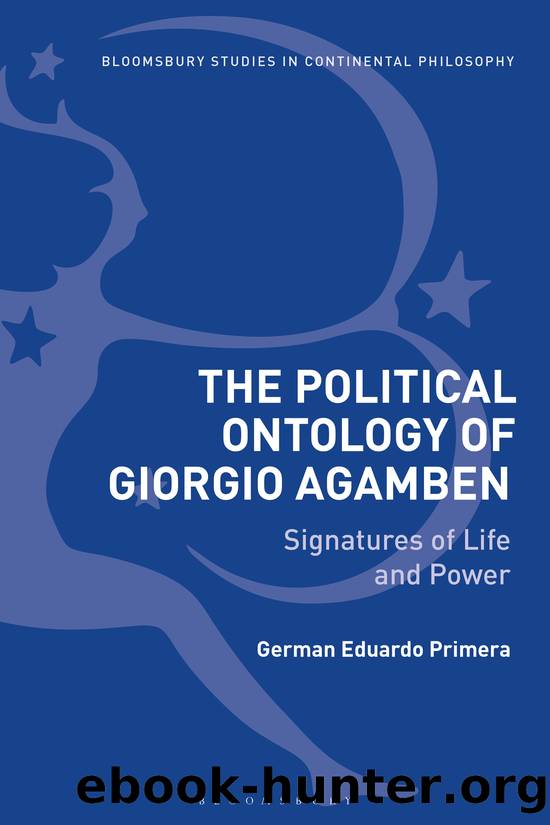The Political Ontology of Giorgio Agamben by Primera German Eduardo;

Author:Primera, German Eduardo;
Language: eng
Format: epub
ISBN: 9781350081376
Publisher: Bloomsbury UK
Neoliberalism: Rearticulating sovereignty and governance
Most of the Foucauldian studies of neoliberalism have focused on the modes of subjectification and the different technologies of governing that constitute this political rationality that renders inoperative the juridico-institutional understanding of sovereignty (cf. Brown, 2015; Dean, 2013; Lemke, 2005). They inquire into the patterns, the strategies and the techniques of government that allow the extension of a market rationality into different domains of social, political and even biological life. Less attention has been given to the transcendent registers of sovereignty that are reconstituted through acts of government under neoliberalism. Indeed, what has taken place with the rise of neoliberal governmentality is not a mere retreat of the state or of sovereignty but the assumption of economic ‘practices and techniques of the whole political life while maintaining a functional relation to a transcendental narrative’ (Zartaloudis, 2010:168).
The significance of Agamben’s theological genealogy of economy and government lies in the fact that it opens up a theoretical terrain from which to rethink neoliberal governmentality and the way it rearticulates, in a novel way, the two axes of power. For Adam Kotsko, Agamben’s shift from the study of sovereignty to analysis of the economic-immanent pole of government – and in particular Agamben’s The Highest Poverty – constitutes ultimately an attempt to confront neoliberalism (2013). There is no doubt that Agamben’s radicalization of the notion of ‘use’ in The Highest Poverty (2013b) and in his The Use of Bodies (2016) offers a new way of conceiving resistance within the neoliberal horizon in which we live today. I will turn to these notions in the final chapter of this book. Here, while agreeing with Kostko that Agamben’s belated engagement with economic theology in The Highest Poverty and in The Kingdom and the Glory is partly his way of talking about the neoliberal economic order, I will focus on the importance of The Kingdom and the Glory for the understanding of neoliberalism as a political rationality5 in terms of the consolidation of governance as its primary administrative form.
When analysed through the filter of the governmental machine, neoliberalism can be located within a larger spectrum of political shifts and configurations of sovereignty and government. The genealogy of oikonomia provides a robust framework to understand the reasons why, under neoliberalism, governance ‘reconceives the political as a field of management or administration’ (Brown, 2015:127). Yet, Agamben’s investigation reminds us that neoliberalism does not merely operate through an immanent administration but that government, even when it is suffused with governance, effectively produces the power which grounds it (Watkin, 2014:210), creating at points the illusion of transcendent registers or simply presenting itself as its own justification.
In this sense, neoliberalism cannot be reduced to a group of economic formulas since it is also a political rationality that organizes this set of particular policies, expands itself outside markets and, more importantly, recasts the bipolarity of the governmental machine. Indeed, neoliberalism as a political rationality ‘is not only or even primarily focused on the economy; rather it involves extending and
Download
This site does not store any files on its server. We only index and link to content provided by other sites. Please contact the content providers to delete copyright contents if any and email us, we'll remove relevant links or contents immediately.
The remains of the day by Kazuo Ishiguro(7541)
Tools of Titans by Timothy Ferriss(6934)
The Black Swan by Nassim Nicholas Taleb(6182)
Inner Engineering: A Yogi's Guide to Joy by Sadhguru(5886)
Giovanni's Room by James Baldwin(5870)
The Way of Zen by Alan W. Watts(5787)
The Six Wives Of Henry VIII (WOMEN IN HISTORY) by Fraser Antonia(4784)
The Power of Now: A Guide to Spiritual Enlightenment by Eckhart Tolle(4747)
Astrophysics for People in a Hurry by Neil DeGrasse Tyson(4613)
Asking the Right Questions: A Guide to Critical Thinking by M. Neil Browne & Stuart M. Keeley(4564)
12 Rules for Life by Jordan B. Peterson(3722)
The Ethical Slut by Janet W. Hardy(3494)
Skin in the Game by Nassim Nicholas Taleb(3455)
Housekeeping by Marilynne Robinson(3395)
The Art of Happiness by The Dalai Lama(3376)
Double Down (Diary of a Wimpy Kid Book 11) by Jeff Kinney(3267)
Skin in the Game: Hidden Asymmetries in Daily Life by Nassim Nicholas Taleb(3259)
Walking by Henry David Thoreau(3227)
12 Rules for Life: An Antidote to Chaos by Jordan B. Peterson(3195)
